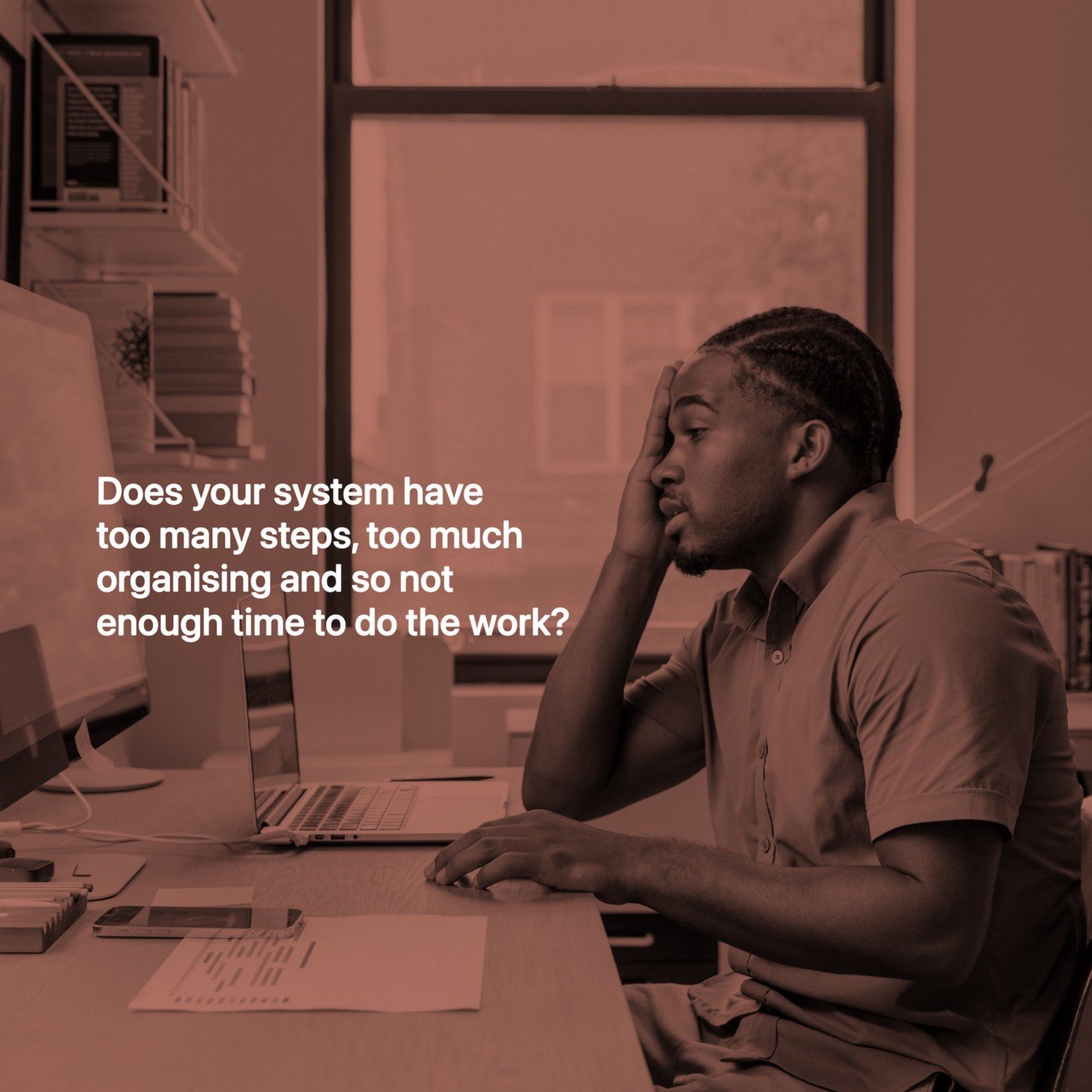Are Your Processes Slowing You Down?
One of the surprising drags on most people’s productivity is the system itself. There are too many steps, too much organising and thus not enough time to do the work.
The way we collect our tasks, commitments, and notes need to be fast and intuitive with as few steps as possible. Organising what we collect should be almost automatic, so it takes up a tiny percentage of what we do each day. And we should be seeking ways to maximise the doing.
For instance, you will likely find if you try to push through a three-hour focused work session, the second half is much less productive than the first half. Recognising that and taking a ten to fifteen-minute fresh air break could be the tweak that maximises that focused time. Yet often, we stubbornly push through, resulting in diminishing returns and more errors to correct later.
Or it could be you are trying to use a full-blown project manager to manage your tasks. Project managers were designed for teams (apps such as Trello, ClickUp and Monday.com), not for individuals attempting to manage their daily tasks. That’s like using an eighteen-wheel truck to take your kids to school. It’s overkill and will radically slow you down when organising your work and planning your day.
And then there are the app switchers. People who are always switching to the latest, trendiest app in the false belief that this time they will find an app that will work for them. No, they won’t because there will be another new app that catches their eye in six months, and it’s all change again.
All this constantly changing, moving tasks, projects, and goals to another new app destroys productivity. There’s no system because systems take time to develop, and for that to happen, you need consistency and a stable set of tools that you master over time.
And then, of course, there’s doing something because it’s always been done a particular way. This can be particularly hard to change if so many of your colleagues and bosses are invested in a system. Sometimes, though, circumstances change to render the old way of doing something obsolete. No matter how hard Blackberry tried to believe that fixed keyboards were a thing, their refusal to change or even contemplate, the changing market soon led to their demise.
It’s essential to be open to adaptation — to changing and tweaking your way of doing things to become faster at collecting and organising. Giving yourself ten to twenty minutes before you end the day to decide what results you want from the next day, for example, means when you start the day, you know exactly what you want to get accomplished and are much less likely to waste time looking for something to do.
That’s a minimal change that will bring you incredible results. Likewise, starting the day with a healthy morning routine. Some quiet time to reflect, perhaps writing your thoughts for ten minutes in a journal or notebook or reviewing your goals every Saturday morning.
None of these are significant changes, they are small, but the benefits they bring you are huge.
And that’s the thing about reviewing your systems regularly. Asking yourself: “how can I do this better?” is powerful. You may not get immediate answers, but simply by asking, you set a mindset of continuous improvement in motion.
Most of the tweaks I make to the way I do my work result from asking that question. From that question, I’ve developed an empowering morning routine that sets me up mentally and physically for the day ahead. I’ve built a go-to set of core exercises I do every afternoon before dinner that exercises all the core muscle groups, and I’ve created a simple closing down routine that leaves me feeling fulfilled and ready for a good night’s sleep.
There’s nothing worse at the end of the day or week than feeling you let yourself down. That you’ve been lazy and not given your best, if your productivity system is not supporting you and slowing down your progress, you will feel frustrated, stressed out, and worse, tired all the time.
So, if you’re feeling out of sorts, that you are not being as productive as you would like to be. Give yourself some time to look at your system. Ask yourself if there are any areas where it could better serve you. Look at how you are collecting stuff. Is it fast? Could you make it faster? How about your organisation? Can you find what you need within five seconds? If not, what could you change that will help you accomplish that?
And finally, are you maximising your doing time? Can you complete all your work within your regular working hours? Or do you find yourself having to work late or bring your work home on the weekend? If so, what could you change about your system to stop that?
Often, we find ourselves working after our regular hours not because of the workload but because we have allowed our work life to enter our personal lives. You have the power to stop that, but you need to set some boundaries — which is not easy but well worth doing.
Thank you for reading my stories! 😊
If you would like to receive all the productivity and time management content I create each week in one convenient email, you can subscribe to my weekly newsletter here
You can also learn more about what I do here on my website
Finally, don’t forget to say hello on Twitter, YouTube or Facebook

